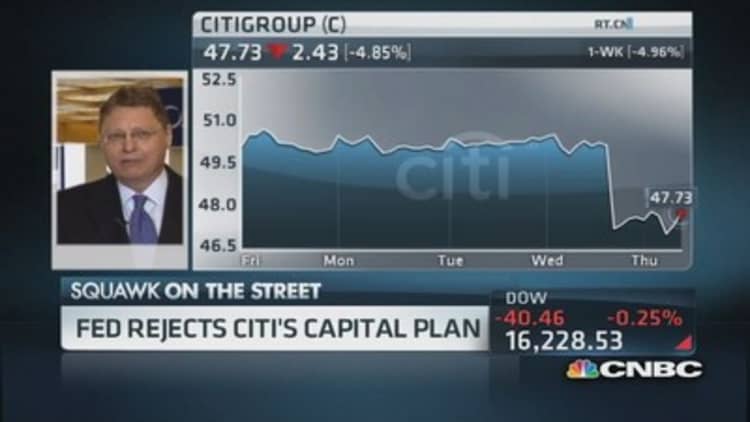
The Federal Reserve has rejected Citigroup's capital plan, saying it's too difficult to determine how parts of its global operations would weather an economic downturn, but some stock market observers said Thursday the bank was really just the Fed's "sacrificial lamb."
Citi was the biggest of five banks whose plans the Fed rejected as part of its so-called stress tests, an annual checkup of the nation's biggest financial institutions. The bank had requested permission for a quarterly dividend of 5 cents per share and a stock buyback program of $6.4 billion, but the Fed turned down the request over concerns about how it would handle another financial crisis.
Read MoreFed rejects Citigroup capital plan
"I think every year the Fed has a sacrificial victim in there. Last year it was Goldman and JPMorgan, which got a qualified pass. The year before it was Citi and SunTrust," said Chris Kotowski, a senior research analyst at Oppenheimer, on "Squawk on the Street."
The Fed had earlier raised concerns about Citi's risk management, Kotowski said. When the central bank's suggestions seemingly fell on deaf ears, though, it struck back with a failing grade, he alleged.
Read MoreCramer on Citi: 'They were very cocky'
Not everyone is so sure the Fed had targeted Citi in such a manner, however.
"I don't think it's political at all. I think it's regulatory," said Benjamin Lawsky, superintendent of the New York state Department of Financial Services, on "Squawk on the Street."
"I don't think it's vindictive to say, 'We told you to fix something. You didn't fix it and now there are going to be consequences.'" Lawsky remarked. "That's just called being a regulator."
To Anna Krayn, an analyst at Moody's Analytics, Citi is really no different than any other big bank. All financial institutions are struggling to improve risk management, a tall order in an environment where the regulations only continue to get tougher, she noted.
"This is an industry challenge. The industry, historically, has underinvested in technology, in process and governance," Krayn said Thursday on "Squawk on the Street." "Whether you look at Citi as a sacrificial lamb or one of the largest banks in this country that had to improve dramatically over last year, what we see actually ... is that the requirements keep rising."

Citi appears to have other problems, though. The Securities and Exchange Commission was reportedly found to be investigating the bank for accounting fraud after it had disclosed $400 million in bad loans in its Banamex unit. Noted bank analyst Dick Bove on Wednesday told "Fast Money" he was very alarmed.
Read MoreSEC investigating Citigroup over Mexico fraud: Source
"The situation in Mexico is, in my view, a horror show because basically, at this stage, seven years after the big crisis which almost—which did make them bankrupt—this company finds that it doesn't have controls in Mexico and lets $400 million walk out the door," he said. "This company is not a 'buy.' I don't care what the price to tangible book is. It is not a 'buy.'"
Read MoreCitigroup's Mexico situation 'a horror show': Dick Bove
Kotowski downplayed the alleged investigation, however, saying "the Mexican hiccup that they had was an excuse for the Fed to say 'No.'"
The Fed and Citi did not immediately respond to requests for comment.
—By CNBC's Drew Sandholm. Follow him on Twitter @DrewSandholm. CNBC's Bruno J. Navarro contributed to this report.


